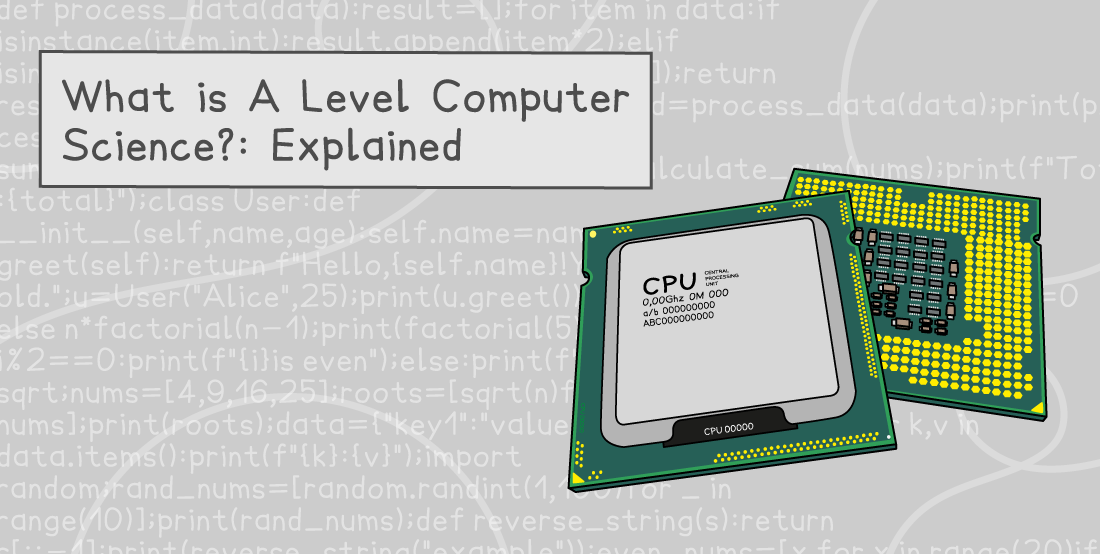What is A Level Computer Science?: Overview for Students
Written by: James Woodhouse
Reviewed by: Robert Hampton
Published

Contents
- 1. What is A Level Computer Science?: Quick summary
- 2. Why study Computer Science at A Level?
- 3. What does A Level Computer Science cover?
- 4. How is A Level Computer Science assessed?
- 5. What are the different assessment objectives?
- 6. What skills will students learn?
- 7. A Level Computer Science exam boards
- 8. Top tips for success
- 9. Frequently Asked Questions about A Level Computer Science
- 10. Boost your grades with Save My Exams
Choosing your A Level subjects can feel overwhelming, especially when it’s hard to tell what each course really involves. Computer Science is often seen as just coding, but it’s so much more than that.
Whilst A Level Computer Science provides various opportunities to develop programming skills, it is also equally about how computers work, how systems are built, and how data is shared securely.
Without a clear picture of what you’ll be learning, it’s tough to know if the subject is right for you. Understandably, it can be difficult when making your A Level choices to work out whether a course is the right fit for you and whether you’ll enjoy it or benefit from it in the future.
In this article, we’ll explain exactly what A Level Computer Science covers, how it’s assessed, and what skills you’ll build along the way.
By the end, you will have a clear understanding of the subject and feel more confident in deciding whether it’s a good fit for you.
What is A Level Computer Science?: Quick summary
A Level Computer Science is a qualification that deepens your knowledge of how computers operate and how to solve problems computationally. You’ll learn about:
Programming and software development
Data structures and algorithms
Computer architecture and operating systems
Networks and security
Databases and Big Data
Functional programming
Legal, ethical, and societal impacts of computing
Both OCR and AQA offer A Level Computer Science courses. Although there are some differences in structure, both focus on developing a strong technical and problem-solving skill set.
Why study Computer Science at A Level?
Studying Computer Science at A Level teaches you not just how technology works, but how to think logically, solve problems systematically, and design solutions for real-world challenges. These skills are essential for a wide range of careers, not just in software development, but also in industries like engineering, finance, healthcare, cybersecurity, and beyond.
Computer Science also opens doors to exciting emerging fields like artificial intelligence, machine learning, and data science.
What does A Level Computer Science cover?
OCR A Level Computer Science covers:
Fundamentals of programming: procedural, object-oriented, and functional programming
Data structures: stacks, queues, graphs, trees, and hash tables
Theory of computation: finite state machines, regular expressions, Turing machines
Data representation: binary, hexadecimal, floating point numbers, character sets
Computer systems and architecture: the CPU, memory, buses, and the fetch-decode-execute cycle
Software development: methodologies including waterfall, agile, spiral, and RAD
Communication and networking: TCP/IP, DNS, LANs and WANs, encryption, network security
Databases and SQL: relational databases, normalisation, transaction processing
Legal, moral, ethical, and cultural issues: data protection, computer misuse, copyright, environmental impacts
AQA A Level Computer Science covers:
Programming: using languages like Python, Java, or C#, covering robust programming techniques
Data structures: arrays, records, linked lists, trees, graphs
Algorithms: sorting and searching methods, computational complexity
Theory of computation: understanding Turing machines, FSMs, abstraction, and automation
Data representation: binary, hexadecimal, floating-point arithmetic, compression
Computer systems and architecture: including hardware, operating systems, and types of software
Communication and networking: network types, TCP/IP, wireless technologies
Databases and Big Data: relational databases, normalisation, SQL, handling large datasets
Functional programming: recursion, higher-order functions
Consequences of uses of computing: ethics, privacy, the digital divide
How is A Level Computer Science assessed?
OCR A Level Computer Science assessment:
Component 1: Computer Systems (40%)
2 hours 30 minutes written exam
Covers hardware, software, databases, networks, and ethics
Component 2: Algorithms and Programming (40%)
2 hours 30 minutes written exam
Focused on programming techniques, algorithms, and data structures
Component 3: Programming Project (20%)
A coursework project where students solve a real-world problem using programming
AQA A Level Computer Science assessment:
Paper 1: Programming and Theory (40%)
2 hours 30 minutes on-screen exam
Includes short-answer programming tasks and theory questions
Paper 2: Theory (40%)
2 hours 30 minutes written exam
Covers theoretical topics like data representation, networking, and databases
Non-Exam Assessment (NEA) (20%)
An independent programming project following a systematic approach to problem solving
What are the different assessment objectives?
Assessment Objective | What it means |
AO1: Knowledge and Understanding | Demonstrate knowledge and understanding of computer science principles and concepts. |
AO2: Application | Apply knowledge and understanding to analyse problems and develop solutions. |
AO3: Analysis and Evaluation | Analyse and evaluate computing solutions critically and logically. |
What skills will students learn?
Logical thinking
You’ll learn how to break down complex tasks into smaller steps and tackle them systematically. This is not only an essential life skill, but also a core part of how real-world problems are solved in Computer Science, mathematics, and engineering. Beyond your studies, employers in fields like finance, law, project management, and even medicine look for people who can think logically and make sound decisions based on evidence rather than guesswork.
Advanced programming
You’ll become confident writing, debugging, and improving large, structured programs, often using languages like Python, Java or C#. Developing strong programming skills means you’ll learn how to build working solutions from scratch, how to spot and fix problems efficiently, and how to design clean, maintainable code. These are the exact same skills used by professional software developers, AI engineers, and data scientists. Even if you don’t go into a tech career, understanding programming builds resilience, persistence, and creativity. These are qualities that are highly valued in almost every modern industry today.
Problem solving
You’ll master how to design efficient algorithms, find errors, and develop reliable, maintainable code. Problem solving in Computer Science teaches you to identify the root of a problem and work towards smart, practical solutions. At A Level, the main difference is that you learn why a problem exists and what the potential solutions or workarounds are.
Analytical skills
You’ll learn to assess systems critically, weigh up different solutions, and make reasoned decisions based on evidence. Analytical skills help you see patterns, predict outcomes, and evaluate the advantages and disadvantages of different options. Good analytical thinkers are valued in areas such as finance, consulting, marketing, politics, engineering, and many other fields where clear thinking and decision-making are crucial.
A Level Computer Science exam boards
The main exam boards for A Level Computer Science are:
OCR (H446): A rigorous course combining programming, theory, and a substantial programming project
AQA (7517): A strong balance of theory and practical programming, with an emphasis on real-world problem solving
Both qualifications are highly respected and offer strong progression routes into university courses or tech careers.
Top tips for success
Practice coding regularly: Programming is a skill that gets better the more you do it. Students benefit from practising their programming regularly and from the very beginning of the course.
Use past papers early: Familiarity with how questions are phrased and marked can make a real difference in your final grade. Students who regularly work through past papers can begin to spot patterns and will, in turn, feel more comfortable in the exam as the questions often sound and look familiar.
Focus on understanding concepts: Especially for algorithms and data structures as memorising won't be enough. Some algorithm questions are quite long and require you to apply logical thinking, abstraction and problem-solving skills.
To learn more about revision strategies, read our article on How to revise for A Level Computer Science.
Frequently Asked Questions about A Level Computer Science
Is A Level Computer Science hard?
It’s a challenging but rewarding subject. If you enjoy solving problems and thinking logically, you’ll find it engaging.
Is A Level Computer Science easy to pass?
With regular coding practice and a strong grasp of theory, students often perform very well.
What careers can A Level Computer Science lead to?
It’s a great choice for careers in software development, cybersecurity, engineering, AI, data science, finance, and beyond.
Boost your grades with Save My Exams
Feeling overwhelmed by revision? Join over 1.5 million students using Save My Exams to prepare smarter, not harder. Our A Level Computer Science resources include:
Explore our A Level Computer Science resources today to take your grade to the next level!
Sign up for articles sent directly to your inbox
Receive news, articles and guides directly from our team of experts.

Share this article


 written revision resources that improve your
written revision resources that improve your